OMA update, protecting mental health services top MAC’s 2022 priorities
 Updating the Open Meetings Act to meet the 21st century needs of state residents and preventing an ill-advised attempt to privatize Michigan’s locally directed system of public mental health services head the list of legislative priorities for Michigan counties this year.
Updating the Open Meetings Act to meet the 21st century needs of state residents and preventing an ill-advised attempt to privatize Michigan’s locally directed system of public mental health services head the list of legislative priorities for Michigan counties this year.
Legislative action in 2020-21 allowed county boards and other local panels to address the restrictions imposed by the COVID-19 pandemic, but the changes also resulted in making the act less responsive in 2022 by barring the votes of public officials participating remotely when a physical quorum was present at a meeting.
“Quick action by the state in 2020 allowed county boards to meet remotely during the pandemic in a safe manner, but those changes ended up removing a key option for local officials to participate in governance in specific situations,” explained Deena Bosworth, MAC’s director of governmental affairs. “We will be focused on OMA reform with legislators to resolve this problem as soon as possible.”
MAC also will continue its efforts with a broad coalition opposed to a mental health privatization scheme embedded in Senate Bill 597-598, sponsored by Senate Majority Leader Mike Shirkey (R-Jackson). Boards in more than 40 counties already have passed resolutions opposing privatization of mental health services, which face growing demands for care and persistent state underfunding.
Other goals for 2022 in Lansing are:
- Enacting Reforms to Ensure Proper Funding of Local Courts
- Creating a Fair Revenue Sharing System for Counties
- Compensating Local Governments for Funds Diverted by the Veterans Property Tax Exemption
- Revamping the PPT Exemption to Provide Annual Reimbursement to Locals
- Adopting the MI Roadmap to Use ARP Funds for Historic Investments in Michigan
“These goals reflect months of meetings and discussions by our policy committees of elected county leaders, by our Board of Directors and by our membership,” said Stephan Currie, MAC’s executive director. “These items constitute the ‘Regional Agenda,’ if you will, from Michigan’s original regional governments, our 83 counties.”
For more information on MAC’s legislative strategies, contact Deena Bosworth at bosworth@micounties.org.
Podcast 83 reviews MAC priorities, discusses State of State
 MAC’s Podcast 83 team gathered for a live session on Thursday, Jan. 27 to analyze Gov. Gretchen Whitmer’s State of the State address and go over MAC’s 2022 priorities, which were released on Jan. 26.
MAC’s Podcast 83 team gathered for a live session on Thursday, Jan. 27 to analyze Gov. Gretchen Whitmer’s State of the State address and go over MAC’s 2022 priorities, which were released on Jan. 26.
“(A)side from accomplishments, she focused on mental health, which is absolutely needed in the state. Getting more health care workers,” said Deena Bosworth, governmental affairs director.
Reviewing MAC’s priorities for the year, Bosworth focused in on the challenges and complexity of resolving reimbursements to counties created by 2021 changes to exemptions for the Personal Property Tax: “We don’t have a good idea on how much money (in lost revenue for counties) that is. … We have a commitment from the Senate to work on it. … So that is what I am going to spend the vast majority of my time on this year — trying to figure how to get that reimbursement out to our counties.”
Executive Director Stephan Currie welcomed the podcast’s new sponsor, Comcast, and noted that with legislative activity gearing up, the podcast would be shifting back to weekly tapings.
To stay abreast of the latest podcast doings, bookmark the Podcast 83 page on MAC’s website and MAC’s YouTube channel.
MAC applauds mention of mental health boost in governor’s annual address
 In a brisk delivery from an industrial plant Wednesday evening, Gov. Gretchen Whitmer emphasized political cooperation and calls for tax cuts in her 2022 State of the State address.
In a brisk delivery from an industrial plant Wednesday evening, Gov. Gretchen Whitmer emphasized political cooperation and calls for tax cuts in her 2022 State of the State address.
The governor also pledged new investments in mental health services, a key priority for Michigan counties, “We should invest in our mental health workforce so we can expand access. Nearly 40% of Michiganders do not get treatment for their mental illness. We will address this shortfall by expanding Michigan’s Loan Repayment Program for mental health professionals. And we will make a historic investment to retain and recruit hundreds more mental health workers.”
Responding to the governor’s comments, MAC Executive Director Stephan Currie said, “Our county members who are entrusted with oversight of the local mental health system were pleased to hear the governor cite mental health as a priority for the year ahead.”
He added, “As the governor develops her budget plans, we hope to see more about long-term investments in local government stability and in water, transportation and broadband infrastructure utilizing the historic opportunity presented by federal COVID aid and the state’s strengthening economy.”
MAC urges members to speak out against binding arbitration bill
 MAC continued its opposition to an ill-advised expansion of binding arbitration coverage for public employees during testimony this week on House Bill 4725, by Rep. Robert Bezotte (R-Howell). The bill would expand binding arbitration beyond police and fire labor bargaining units to correctional officers.
MAC continued its opposition to an ill-advised expansion of binding arbitration coverage for public employees during testimony this week on House Bill 4725, by Rep. Robert Bezotte (R-Howell). The bill would expand binding arbitration beyond police and fire labor bargaining units to correctional officers.
The legislation, which previously cleared the House 97-10, is before the Senate Economic and Small Business Development Committee, so MAC asks members to use our Advocacy Center to send a pre-drafted message of opposition to their state senators.
MAC has long opposed any expansion of binding arbitration to other bargaining units due to the cost of the process, the long-term liabilities associated with third-party decisions and the unequal treatment such a system provides to those bargaining units. The Michigan Public Employment Relations Act already provides for bargaining rights without tying the hands of the county in binding arbitration.
For more information on this issue, contact Deena Bosworth at bosworth@micounties.org.
U.S. Treasury issues clarification on $10 million revenue loss and COVID aid
 The U.S. Treasury has issued the following important clarifications on how to report revenue replacement and other expenditures in the Project and Expenditure Report, said the National Association of Counties this week:
The U.S. Treasury has issued the following important clarifications on how to report revenue replacement and other expenditures in the Project and Expenditure Report, said the National Association of Counties this week:
- Option to defer choice of claiming $10 million standard revenue loss allowance: If a county has not decided whether or not to take the standard allowance, Treasury won’t commit them to their reported choice in the Jan. 31 report.
- Decisions made in the reporting around the standard allowance as part of the Jan. 31 Project and Expenditure Report may be changed in the April 2022 Project and Expenditure report when the Final Rule takes effect. More guidance on this will be released as we approach that reporting period.
- If a county has nothing to report in the Revenue Replacement section and doesn’t want to make any choice, they may enter zero in the required fields and use the description box to explain that they have not yet allocated funds under revenue loss and will update their response in future reporting cycles. Treasury may choose to follow up in these cases for further details.
- What to do if a county has no projects to report on the January 31 Project and Expenditure Report: If your county has not yet identified any projects to report, please know that maintaining a project list is a core requirement of the Recovery Fund program. For the Project and Expenditure Report due January 31, 2022, Treasury will be offering an option to select “No Projects to Report” at this time. Selecting this option will require providing a written explanation and may result in additional compliance follow-up from Treasury. Please see the user guide for additional guidance; information will also be provided in the Project Overview module of the Project and Expenditure Report. If you have questions or need additional information, please send an email via SLFRP@treasury.gov.
- Additional resources and helpful information from Treasury: If you are unable to log in to Treasury’s State, Local, and Tribal Support portal after establishing your accounts or need technical or other assistance, please send us an email at covidreliefitsupport@treasury.gov for
- Treasury has posted a series of recorded webinars to assist recipients to understand and comply with relevant reporting requirements and assist recipients in accessing Treasury’s Portal:
- Project and Expenditure Report – https://youtu.be/6YTsxrEMS1o
- Reporting Tiers – https://youtu.be/JnoKlSwCA-g
- Account Creation and Login – https://youtu.be/MS7EAO2uCs0
- User Roles – https://youtu.be/w7vbi94rVDI
- Bulk Uploads – https://youtu.be/4g6fw3DUQ3k
As a reminder, the following counties, the following counties are required to submit a Project and Expenditure Report the Treasury by Jan. 31, 2022:
- Counties with populations that exceed 250,000 residents (referred to as Tier 1 recipients by Treasury)
- Counties with a population below 250,000 residents which received more than $10 million in Recovery Funds (referred to as Tier 2 recipient by Treasury)
The Project and Expenditure Report will cover the period between March 3, 2021, and Dec. 31, 2021, and requires the reporting of project, obligations and expenditure data, subaward data, as well as certain required programmatic data.
Please note: Counties with populations below 250,000 residents and received less than $10 million in Recovery Funds, are not required to submit a report by January 31, 2022, and there will not be a report record available for you to do so. Your first reporting deadline to submit the Project and Expenditure Report will be April 30, 2022, and annually afterwards. A Project and Expenditure Report will be made available for your jurisdiction to complete ahead of your April 30, 2022, deadline.
Public notice bills don’t help counties, MAC tells House committee
 Bills purporting to modernize Michigan’s requirements for local governments to issue public notices got a thumbs down by MAC in a House hearing this week.
Bills purporting to modernize Michigan’s requirements for local governments to issue public notices got a thumbs down by MAC in a House hearing this week.
MAC testified in opposition to Senate Bill 258, by Sen. Curt VanderWall (R-Mason), and SB 259, by Sen. Sylvia Santana (D-Wayne), before the House Local Government and Municipal Finance Committee. The bills passed the Senate 34-0 last fall.
Deena Bosworth, MAC governmental affairs director, told committee members that counties oppose the current version of both bills as they do not curb county costs to do postings, reduce the unnecessary details of many of the posting requirements or assist locals in meeting legal timelines.
Bosworth added that MAC remains ready to work with sponsors on amending the legislation to make it beneficial to counties that have to navigate a media landscape far different from the one of the 1960s when notice requirements were enacted.
For more information on this issue, contact Deena Bosworth at bosworth@micounties.org.
 Staff picks
Staff picks
- Survey: 52% of state, local public workers considering leaving jobs (RouteFifty)
- Cities and states find new ways to tax streaming services (Pew Trusts)
- State and Federal Broadband Programs (Michigan House Fiscal Agency)
- Thelma Sutcliffe, oldest person in U.S., dies at 115 (NBC)

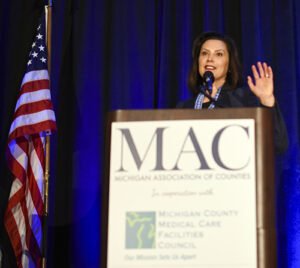 Gov. Gretchen Whitmer will keynote the 2022 Michigan Counties Legislative Conference, addressing a plenary session of the event on Wednesday, March 23.
Gov. Gretchen Whitmer will keynote the 2022 Michigan Counties Legislative Conference, addressing a plenary session of the event on Wednesday, March 23. The Army Corps of Engineers will receive $479 million from the bipartisan Infrastructure Investment and Jobs Act to invest in modernizing the Soo Locks. The money received from the Infrastructure Investment and Jobs Act brings the funding total to $1.3 billion for the
The Army Corps of Engineers will receive $479 million from the bipartisan Infrastructure Investment and Jobs Act to invest in modernizing the Soo Locks. The money received from the Infrastructure Investment and Jobs Act brings the funding total to $1.3 billion for the  A new method of purchasing emergency response vehicles for local governments would be available under
A new method of purchasing emergency response vehicles for local governments would be available under  Michigan’s courts need to continue work to improve case management and transparency, said new reports filed by two panels convened by the State Court Administrative Office (SCAO).
Michigan’s courts need to continue work to improve case management and transparency, said new reports filed by two panels convened by the State Court Administrative Office (SCAO). The Michigan Jail Reform Advisory Council (JRAC) is seeking public comments in advance of its next meeting on Thursday, Feb. 10, which will be held remotely via Zoom. This feedback will assist the JRAC in implementing policy and practice changes, developing educational materials, supporting justice system practitioners, and monitoring performance measures.
The Michigan Jail Reform Advisory Council (JRAC) is seeking public comments in advance of its next meeting on Thursday, Feb. 10, which will be held remotely via Zoom. This feedback will assist the JRAC in implementing policy and practice changes, developing educational materials, supporting justice system practitioners, and monitoring performance measures.  The Michigan Department of Natural Resources is hosting a virtual recreation grants workshop from 1 p.m. to 3 p.m. on Feb. 1, 2022, to assist you in applying for funding through the Natural Resources Trust Fund, Land and Water Conservation Fund and Recreation Passport Grant Programs. The workshop covers the process and requirements to apply for grants supporting the acquisition or development of a public outdoor recreation facility.
The Michigan Department of Natural Resources is hosting a virtual recreation grants workshop from 1 p.m. to 3 p.m. on Feb. 1, 2022, to assist you in applying for funding through the Natural Resources Trust Fund, Land and Water Conservation Fund and Recreation Passport Grant Programs. The workshop covers the process and requirements to apply for grants supporting the acquisition or development of a public outdoor recreation facility. On Thursday afternoon,
On Thursday afternoon,  Following the release last week of the federal Final Rule on State and Local Fiscal Recovery Fund, federal, state and National Association of Counties experts have been providing overviews and analyses of key points for local leaders. MAC strongly encourages county officials to carefully study all these resources in the coming days.
Following the release last week of the federal Final Rule on State and Local Fiscal Recovery Fund, federal, state and National Association of Counties experts have been providing overviews and analyses of key points for local leaders. MAC strongly encourages county officials to carefully study all these resources in the coming days. The 15th Updates and Resources for Local Governments” led by the Michigan Treasury, and co-sponsored by MAC and other local government groups, will be on Jan. 25 from 2 p.m. to 3 p.m.
The 15th Updates and Resources for Local Governments” led by the Michigan Treasury, and co-sponsored by MAC and other local government groups, will be on Jan. 25 from 2 p.m. to 3 p.m.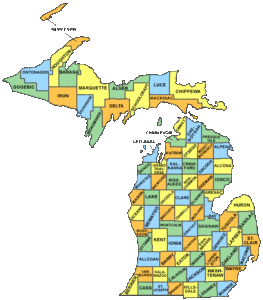 A new state office will focus on the “economic, social, and educational needs in rural areas” under an order by Gov. Gretchen Whitmer.
A new state office will focus on the “economic, social, and educational needs in rural areas” under an order by Gov. Gretchen Whitmer. U.S. Sen. Debbie Stabenow (D-Mich.) will host a series of virtual sessions with local leaders in January to update them on federal infrastructure funding opportunities for your community.
U.S. Sen. Debbie Stabenow (D-Mich.) will host a series of virtual sessions with local leaders in January to update them on federal infrastructure funding opportunities for your community. A Michigan Infrastructure Office announced by Gov. Gretchen Whitmer this week will focus on utilizing resources coming to the state from the federal Infrastructure Investment and Jobs Act.
A Michigan Infrastructure Office announced by Gov. Gretchen Whitmer this week will focus on utilizing resources coming to the state from the federal Infrastructure Investment and Jobs Act. MAC offices closed on Monday, Jan. 17
MAC offices closed on Monday, Jan. 17 The deadline for eligible local governments to voluntarily participate in two historic opioid settlements has been extended to Jan. 26, Michigan Attorney General Dana Nessel’s office announced this week.
The deadline for eligible local governments to voluntarily participate in two historic opioid settlements has been extended to Jan. 26, Michigan Attorney General Dana Nessel’s office announced this week. Public meetings in Michigan governed by the state’s Open Meetings Act (OMA) are now under more restrictive rules on remote participation, as of Jan. 1, 2022. This means that commissioners cannot participate in a county board session as a voting member via electronic means, with only one narrow exception.
Public meetings in Michigan governed by the state’s Open Meetings Act (OMA) are now under more restrictive rules on remote participation, as of Jan. 1, 2022. This means that commissioners cannot participate in a county board session as a voting member via electronic means, with only one narrow exception.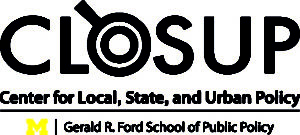 A University of Michigan webinar on Jan. 19, “
A University of Michigan webinar on Jan. 19, “ Final chance to speak on health IT needs is Jan. 26
Final chance to speak on health IT needs is Jan. 26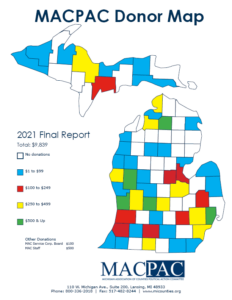 MACPAC raises almost $10,000 in 2021 from nearly 90 donors
MACPAC raises almost $10,000 in 2021 from nearly 90 donors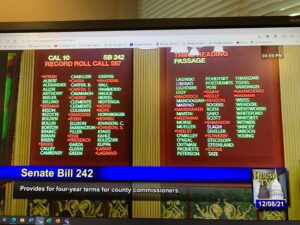
 Actuarial assumptions for local governments with defined benefit plans were released this week by the Michigan Department of Treasury.
Actuarial assumptions for local governments with defined benefit plans were released this week by the Michigan Department of Treasury.




